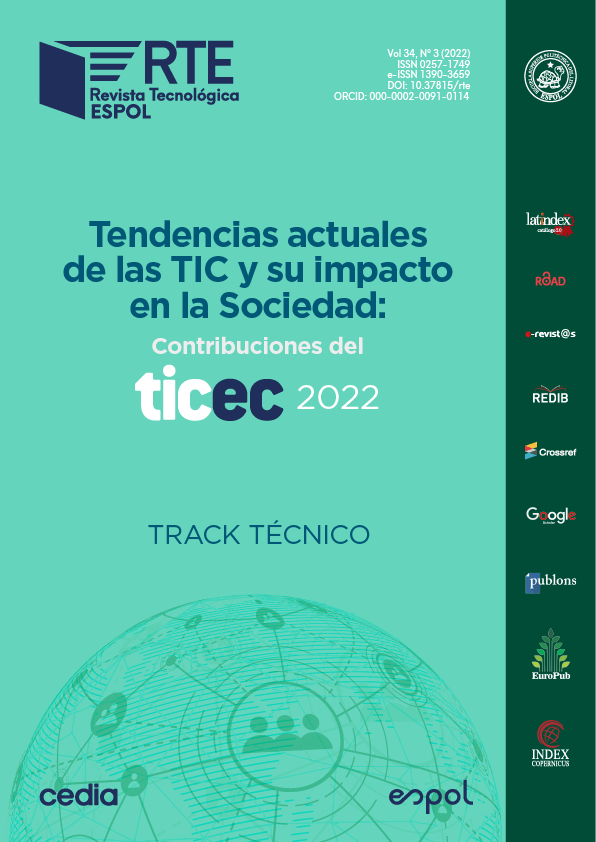This article performs a comparative analysis of the power intensity levels measured with the Network Cell Info Lite application and the performance of the different propagation models: Log-Normal, Okumura Hata, COST 231, Walfish Bertoni, and SUI in the 4G LTE Frequency Band. The study was conducted in five LTE coverage cells located in the southern area of the city of Riobamba. The model that best fits each cell was chosen by means of absolute error analysis, thus obtaining an empirical correction factor for the proposed models. For the analysis of the absolute error, three measurement campaigns were carried out with 50 samples where the mean value was obtained. After applying the aforementioned models, the Log-Normal model yielded the most favorable results, being the one that achieved the best adaptation in Riobamba, since the power levels vary in the range (-80; -106) dBm at a coverage area not exceeding 200m.

This work is licensed under a Creative Commons Attribution-NonCommercial 4.0 International License.
References
Anonymous. (1968). Okumura model. Mobile Radio Propagation: Large-Scale Path Loss. https://elearning.espoch.edu.ec/pluginfile.php/1518133/mod_resource/content/1/sysc5608-AntProp-A21-A25.pdf
Aguilar, L. (2010). Walfisch bertoni model. Share and Discover Knowledge on SlideShare. https://pt.slideshare.net/eliche04/modelo-de-walfisch-bertoni
A. (2019). Broadcast and TV reception. Spread, from https://www2.ulpgc.es/hege/almacen/download/27/27199/propagacion.pdf
Bekele, N., & Demissie, B. (2017). Analyzing and modeling of geo spatial effect on radio wave propagation system using geospatial technologies. SCIRP Open Access. https://www.scirp.org/journal/paperinformation.aspx?paperid=81536
Blaunstein, N., Toeltsch, M., Laurila, J., Bonek, E., Katz, D., Vainikainen, P., Tsouri, N., Kalliola, K. & Laitinen, H. (2006). Signal power distribution in the azimuth, elevation and time delay domains in urban environments for various elevations of base station antenna. https://publik.tuwien.ac.at/files/pub-et_11863.pdf
Garcia, A., Ortega, H., Navarro, A. & Rodriguez, A. (2004). Effect of terrain on electromagnetic propagation in urban environments on the Andean region, using the COST231-Walfisch-Ikegami model and GIS planning tools. IEEE Xplore. https://ieeexplore.ieee.org/document/1353626
Hadi, S. & Tiong, T. (2015). Adaptive modulation and coding for LTE wireless communication. IOP Conf. Ser.: Mater. Sci. Eng. 78 012016. https://iopscience.iop.org/article/10.1088/1757-899X/78/1/012016/pdf
Heintzenberg, J. (1994). Properties of the log-normal particle size distribution, Leipzig, Germany. https://www.researchgate.net/publication/233157378_Properties_of_the_Log-Normal_Particle_Size_Distribution
Hernando, J., Riera, J., & Mendo, T. (2013). Radio transmission: Vol. 7. Radio transmission (7a ed.). Ramon Areces University Publishing House.
ITU-R P.833-3, R. (2001). Attenuation due to vegetation. International Telecommunications Union. Retrieved August 11, 2022, from https://www.itu.int/dms_pubrec/itu-r/rec/p/R-REC-P.833-3-200102-S!!PDF-S.pdf
ITU-R P.1407-1, R. (2003). Multipath propagation and parameterization of its characteristics. Multipath propagation and parameterization of its characteristics. from https://www.itu.int/dms_pubrec/itu-r/rec/p/R-REC-P.1407-1-200304-S!!PDF-S.pdf
Li, X., Li, S., Zhang, D., Xiong, J. & Wang, Y. (2016). Dynamic-MUSIC: Accurate device-free indoor localization. Heidelberg, Germany. https://ink.library.smu.edu.sg/cgi/viewcontent.cgi?article=4391&context=sis_research
Pérez Gracia, M. (2001, October 26). underground radar. Evaluation for applications in archeology and historical-artistic heritage. Retrieved on August 11, 2022, from https://www.tdx.cat/bitstream/handle/10803/6216/13capitulo04.pdf?sequence#:~:text=La%20atenuaci%C3%B3n%20como%20resultado% 20of ,the%20case%20of%20means%20materials.
Rao, A., Weber, A., Gollamudi. S. & Soni, R. (2009). LTE and HSPA+: Revolutionary and evolutionary solutions for global mobile broadband | Semantic Scholar. Semantic Scholar | AI-Powered Research Tool. https://www.semanticscholar.org/paper/LTE-and-HSPA+:-Revolutionary-and-evolutionary-for-Rao-Weber/c489aee76072912ed14804d439719cb5ef0d0b23
Shabbir, N., Sadiq, M. T., Kashif, H. y Ullah, R. (2011). Comparison of radio propagation models for long term evolution (LTE) network. https://elearning.espoch.edu.ec/pluginfile.php/1518137/mod_resource/content/1/1110.1519.pdf
Shahajahan, M. & Abdulla Hes-Shafi, A. Q. M. (2009) Analysis of propagation models for wimax at 3.5 GHz. http://www.diva-portal.org/smash/get/diva2:830403/FULLTEXT01.pdf
Tomažič, S. & Jakuš, G. (2009). Long term evolution: Towards 4th generation of mobile telephony and beyond. IEEE Xplore. https://ieeexplore.ieee.org/document/5339397
Union, I. T. (1995). Recommendation ITU-R p.529-2 prediction methods for the terrestrial land mobile service in the vhf and UHF bands. https://www.itu.int/dms_pubrec/itu-r/rec/p/R-REC-P.529-2-199510-S!!PDF-E.pdf#:~:text=Rec.%20ITU-R%20P.529-2%201%20RECOMMENDATION%20ITU-R%20P.529-2%20PREDICTION,BANDS%20(Question%20ITU-R%20203/3)%20(1978-1990-1995)%20Rec.%20ITU-R%20P.529-2
Ubierna, O. (2018). Cellular repeaters and distributed antenna systems DAS. Wireless technology blog., from https://www.comunicacionesinalambricashoy.com/wireless/repetidores-moviles-y-sistemas-de-antenas-distribuidos-das/
Walfish, J. & Bertoni, H. L. (1988). A theoretical model of UHF propagation in urban environments. https://www.researchgate.net/publication/3007907_A_Theoretical_Model_of_UHF_Propagation_in_Urban_Environments
Y., Okumura. (1967). Field strength and its variability in VHF and UHF land-mobile radio service. 16:825-873.
Yepez, L. & Gragirena, M. (2012). Corroboration of the "indoor" propagation model log-normal shadowing path loss model and characterization of buildings electrical/electronic and classrooms. http://www.usfx.bo/nueva/vicerrectorado/citas/TECNOLOGICAS_20/Ingenieria%20Electrica/78.pdf
Zhang, L., Xia, L., Liu, Z., Jing, J. & Ma, Y. (2012). Evaluating the Optimized Implementations of SNOW3G and ZUC on FPGA. IEEE Xplore. https://ieeexplore.ieee.org/document/6296005







